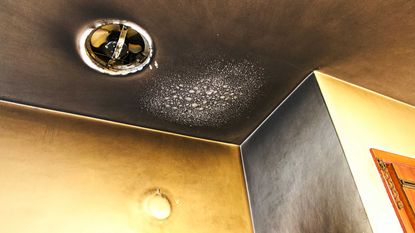After a Fire Loss, Dealing with Your Insurance Company
A retired claims adjuster and an expert witness in insurance coverage cases outline some definite do’s and don’ts for homeowners working through the insurance claims process.
- (opens in new tab)
- (opens in new tab)
- (opens in new tab)
- Newsletter sign up Newsletter


The proper smoke and carbon monoxide (CO) alarms can mean the difference between having a home to live in – or even having a life to live at all, considering 80% of deaths from home fires that occur between 11 p.m. and 7 a.m.
Luckily, “Anna” and “Danny” were not one of those statistics, because they had a CO detector that went off early in the morning of Dec. 28, 2021.
“It was a smoldering ceiling fire in our attic with little smoke, but which created carbon monoxide. Our Kidde CO detector woke us from a deep sleep, giving us time to call 911. Only a small bathroom and laundry area off of the kitchen were damaged,” Danny said.

Sign up for Kiplinger’s Free E-Newsletters
Profit and prosper with the best of expert advice on investing, taxes, retirement, personal finance and more - straight to your e-mail.
Profit and prosper with the best of expert advice - straight to your e-mail.
“We would appreciate any guidance you can offer so we don’t do the wrong things with our insurance claim.”
Fire? Here’s What NOT to Do
I ran Danny’s important question by friends of this column, Los Angeles-based retired homeowners claims adjuster Rachel Greenberg and Karl Susman, an insurance broker and expert witness in insurance coverage issues.
Rachel: Don’t delay in calling 911 when you smell smoke or suspect there is a fire.
Consequences: This raises a suspicion of arson. Policyholders have a duty to mitigate (reduce) damages under the terms of the policy.
Karl: In addition to phoning 911, immediately report the claim to your insurance carrier. Delay in both instances makes the entire claim suspect and may affect payment, even if legitimate.
Rachel: Don’t fail to promptly begin making an inventory of what was destroyed or damaged. And don’t be a hero and start do-it-yourself repairs.
Consequences: Homeowners policies generally provide replacement coverage, but you’ve got to know what was lost. Unless you have date-stamped photos – showing the structure and contents of closets and drawers – the further away from the incident, your memory will suffer and you will not be paid for what you can’t prove was in your home.
Karl: By starting to fix things yourself, you might not realize that the damage is far more extensive. If you do it on your own without approval of the claims rep, chances are that you may not be properly reimbursed.
These Things Are Giant Red Flags to Avoid
Rachel: Having a bad attitude towards the claims adjusters.
Consequences: They might drag their feet instead of moving things along quicker. This is a time to be patient and cooperative. Their job is to help you. They aren’t your enemy!
Being a jerk, overly anxious and pushy will slow thing down. If you insist that you need that money and you need it NOW, there is usually a problem. Adjusters think, “Someone is in a lot of debt and sees the insurance claim as a quick way to get some cash to pay it off.”
Karl: How you react at the scene is important. Carriers receive copies of first responders’ reports. All of that information is passed on to the adjuster. They are trained to sniff out fraud, especially inflating what was lost. If a homeowner is pushy, this will make the adjuster suspicious – and a credit check will be done.
Don’t do it. Don’t pad the list of items destroyed. If caught, in some states, the insurance company can deny the entire claim.
Rachel: Abusing the “Temporary Living Expenses” section of your insurance policy by checking into the presidential suite at the Ritz-Carlton and having room service bring caviar each day for breakfast.
Consequences: “Can I stay wherever I want?” is a frequently asked question. You need to stay somewhere that is similar to where you were living before. This does not mean a million-dollar mansion at Malibu, unless that’s where you were living before the loss.
Approval from your adjuster – before renting an apartment or checking into a very expensive hotel – is required, or you could face a denial of payments under that section of your policy. Often insurance companies have pre-negotiated room rates with very nice properties, so it is always important to give your adjuster a chance to find lodgings for you.
Karl: You will not be rewarded for extravagant expenses. If you did not order the most expensive item on the menu every day before the fire, you are not going to be reimbursed for doing so after it. “Is this how you and your family normally eat?” an adjuster will ask if presented with a mind-numbing bill for dining at fancy restaurants.
Thinking: “I have been paying my premiums for 20 years and you guys owe this to me! Now is my chance to get my money’s worth,” is not the way insurance works.
It is so important to use common sense before a fire or other loss. With expensive items of jewelry, clothing, anything of unusual value, let your agent know about it, and obtain an appraisal and possibly a rider for it.
Concluding our discussion, both Rachel and Karl stressed this final point:
“Don’t embellish, lie, rush, assume or guess. Do not create an adversarial relationship with your adjuster. They are not your enemy!”
Dennis Beaver Practices law in Bakersfield and welcomes comments and questions from readers, which may be faxed to 661-323-7993, or e-mailed to Lagombeaver1@gmail.com. And be sure to visit dennisbeaver.com (opens in new tab).
This article was written by and presents the views of our contributing adviser, not the Kiplinger editorial staff. You can check adviser records with the SEC or with FINRA.

After attending Loyola University School of Law, H. Dennis Beaver joined California's Kern County District Attorney's Office, where he established a Consumer Fraud section. He is in the general practice of law and writes a syndicated newspaper column, "You and the Law (opens in new tab)." Through his column he offers readers in need of down-to-earth advice his help free of charge. "I know it sounds corny, but I just love to be able to use my education and experience to help, simply to help. When a reader contacts me, it is a gift."
-
-
 Chase Launches $1K Bonus Offer For Sapphire Card
Chase Launches $1K Bonus Offer For Sapphire CardThe Chase Sapphire Preferred® Card recently launched a jaw-dropping deal for new customers.
By Ellen Kennedy • Published
-
 Stock Market Today: Nasdaq Outperforms on Microsoft Earnings
Stock Market Today: Nasdaq Outperforms on Microsoft EarningsThe Nasdaq led in a mixed session for stocks Wednesday as Big Tech earnings impressed.
By Karee Venema • Published
-
 For Best Tax Savings, Year-Round Tax Planning Is Essential
For Best Tax Savings, Year-Round Tax Planning Is EssentialFor optimal, ongoing tax reduction, consider employing these nine strategies throughout the entire year.
By Andy Leung, Private Wealth Adviser • Published
-
 From SECURE Act to SECURE 2.0: Is Your Estate Plan Safe?
From SECURE Act to SECURE 2.0: Is Your Estate Plan Safe?The ever-evolving legislative landscape provides both challenges and opportunities when it comes to making plans for your retirement and your estate. A key focus: tax planning.
By Lindsay N. Graves, Esq. • Published
-
 Is Inflation a Big Retirement Worry? How to Protect Savings
Is Inflation a Big Retirement Worry? How to Protect SavingsConcerns about how inflation eats into your resources or limits your ability to save sufficiently for retirement are real, but there are four things you can do to cope.
By Jason “JB” Beckett • Published
-
 Short-Term Financial Planning for First-Time Parents
Short-Term Financial Planning for First-Time ParentsA seasoned wealth adviser shares his experience with the financial planning he and his wife did for the arrival of their first bundle of joy.
By Kara Duckworth, CFP®, CDFA® • Published
-
 Longevity: The Retirement Problem No One Is Discussing
Longevity: The Retirement Problem No One Is DiscussingMany people saving for retirement fail to take into account how living longer will affect how much they’ll need once they stop working. What should they do?
By Brian Skrobonja, Chartered Financial Consultant (ChFC®) • Published
-
 Capital Gains Taxes Trap: How to Avoid Mutual Fund Tax Bombs
Capital Gains Taxes Trap: How to Avoid Mutual Fund Tax BombsIt’s bad enough when your mutual fund’s assets lose value, but owing unexpected capital gains taxes after those losses is doubly frustrating.
By Samuel V. Gaeta, CFP® • Published
-
 Why Investors Should Avoid Buying the Banking Sector Dip
Why Investors Should Avoid Buying the Banking Sector DipEven though things appear to have settled after SVB's collapse, that doesn’t mean all is clear. Consider options like healthcare and consumer staples instead.
By Austin Graff, CFA • Published
-
 Four Sustainable Investments That Could Have a Positive Impact
Four Sustainable Investments That Could Have a Positive ImpactAs we celebrate Earth Day, consider doing some research aimed at transitioning to a more sustainable and responsible portfolio. These four companies are worth a look.
By Peter Krull, CSRIC® • Published









